
Overview
This article presents authoritative strategies for effective ad repetition that can significantly enhance brand recall. By leveraging a combination of personalized messaging, emotional engagement, and a multi-channel approach, brands can markedly improve consumer recognition and loyalty. Successful campaigns from industry leaders like Coca-Cola and Apple serve as compelling evidence of the effectiveness of meticulously balanced ad exposure. These case studies illustrate the profound impact that strategic ad repetition can have on consumer perception and brand loyalty.
Introduction
Ad repetition has emerged as a formidable strategy in the marketing landscape, significantly enhancing brand recall and consumer engagement. By leveraging insights from consumer psychology and data analysis, brands can craft tailored advertising strategies that not only boost product recognition but also cultivate enduring customer loyalty.
However, the challenge lies in striking the right balance—how can companies effectively repeat their messages without overwhelming their audience or inducing ad fatigue? This article explores ten innovative strategies for effective ad repetition, providing valuable insights into optimizing brand recall while sustaining consumer interest.
Parah Group: Comprehensive Conversion Rate Optimization for Effective Ad Repetition
Parah Group stands at the forefront of high-velocity Conversion Rate Optimization (CRO) programs, meticulously crafted to empower DTC companies in enhancing profitability through robust advertising strategies. Leveraging consumer psychology and data analysis, Parah Group formulates tailored CRO strategies that significantly boost product recognition through the use of strategic ad repetition. This method is substantiated by research indicating that can elevate product recognition and memory by as much as 80%. Their holistic approach guarantees that every element of a client's marketing strategy is harmonized to promote substantial growth, solidifying Parah Group's position as a leader in the CRO sector.
Industry experts highlight the crucial importance of ad repetition in enhancing conversion rates. For example, personalized call-to-action buttons have demonstrated a conversion rate improvement of 202% over standard options, highlighting the power of customized messaging in repeated advertisements. Success stories from Parah Group's clientele illustrate the concrete benefits of their CRO initiatives; one notable case involved a DTC company that achieved a remarkable 36% increase in ROI on ads through optimized ad repetition. This comprehensive methodology not only enhances recognition but also fosters enduring customer loyalty, establishing Parah Group as the preferred partner for companies seeking to redefine their growth trajectory.
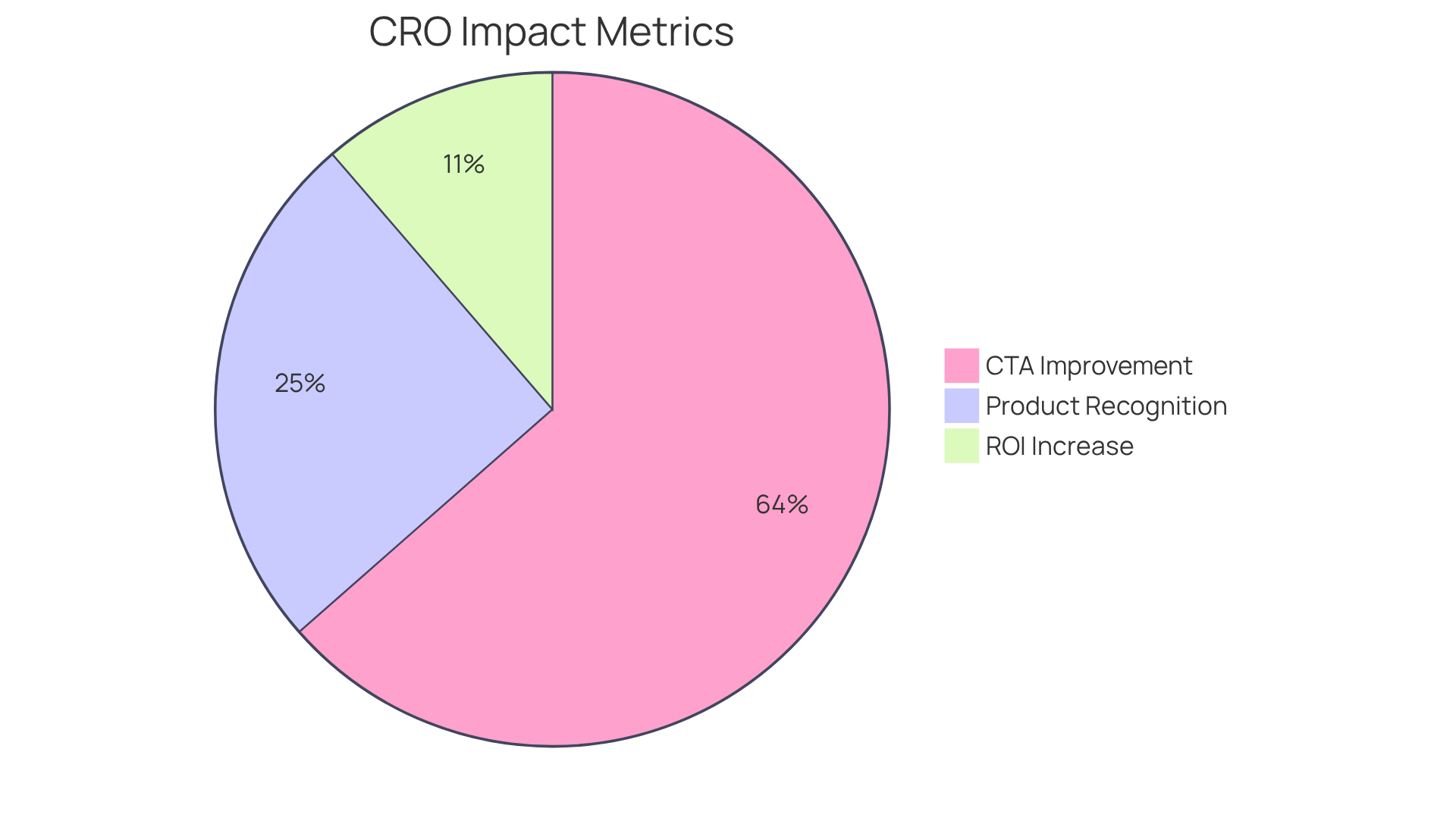
Coca-Cola: Leveraging Personalization in 'Share a Coke' Campaign
Coca-Cola's 'Share a Coke' campaign revolutionized consumer interaction by personalizing bottles with individual names, thereby establishing a unique connection with customers. This innovative strategy not only drove purchases but also cultivated nostalgia and to the brand.
In 2025, Coca-Cola reintroduced the campaign, specifically targeting Gen Z with a strong emphasis on shareability and customization. By incorporating features such as the 'Share a Coke Memory Maker,' which enables users to create distinctive videos, and utilizing QR codes on bottles to enhance personalization, Coca-Cola effectively strengthened product recall.
This approach illustrates that the synergy of personalization and ad repetition can substantially elevate engagement and loyalty, positioning it as a formidable model for contemporary advertising.
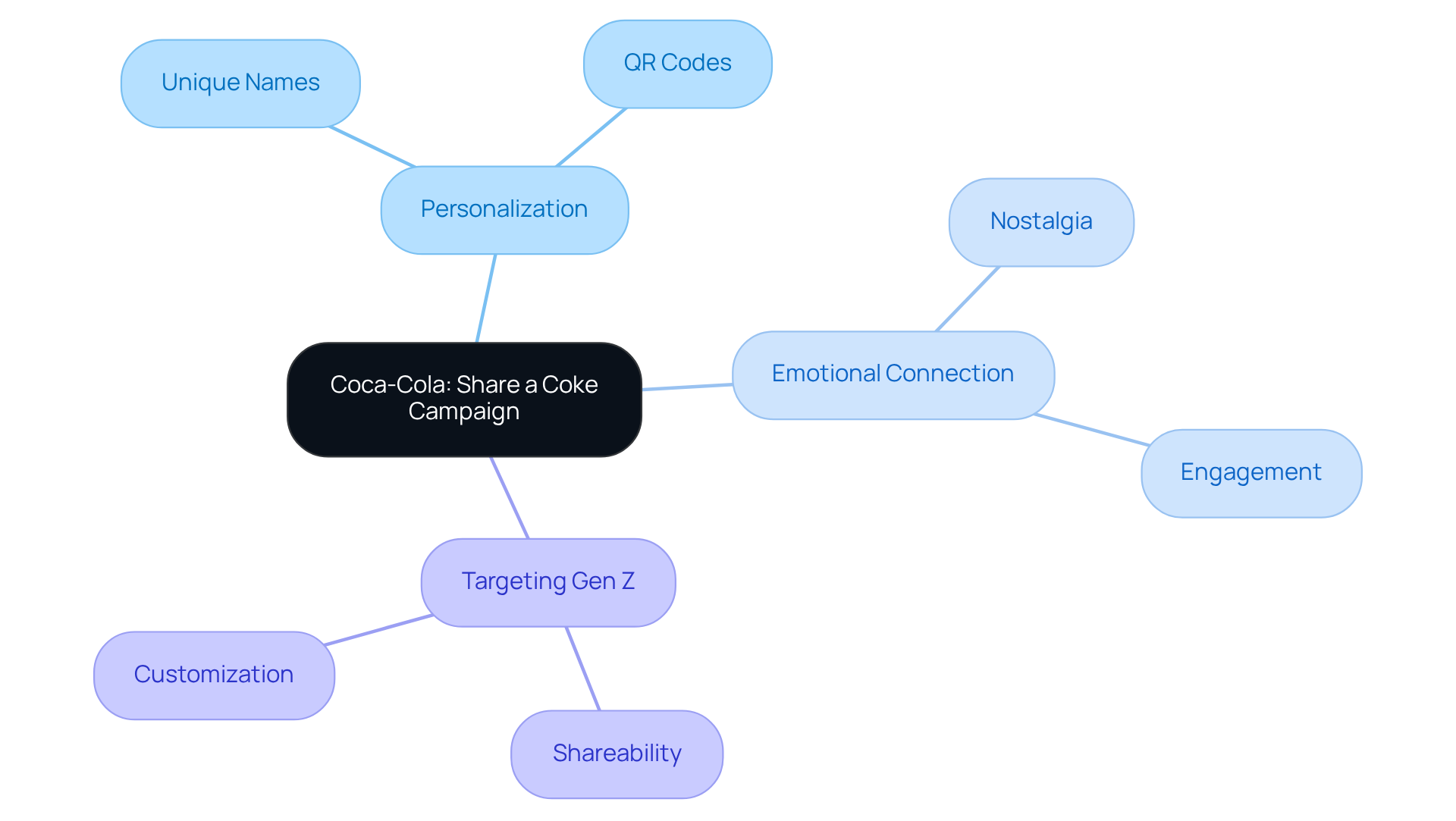
Nike: Building Brand Identity Through Repetitive Messaging in 'Just Do It'
Nike's 'Just Do It' slogan stands as a cornerstone of its identity, exemplifying the profound impact of ad repetition in marketing. Launched in 1988, this iconic tagline has been consistently utilized across diverse campaigns, embedding itself in public consciousness and enhancing recall. The effectiveness of this strategy is rooted not only in its motivational appeal but also in its use of ad repetition to forge a deep emotional connection with consumers.
Marketing specialists assert that such repetition cultivates familiarity, a critical component for fostering customer loyalty. For instance, the recent 'Why Do It?' campaign introduces a fresh perspective while ultimately concluding with the time-honored 'Just Do It' message, thereby reinforcing the company’s enduring legacy.
This approach illustrates how brands can evolve while maintaining their —a balance deemed essential by experts for engaging both new and existing audiences. As noted by industry authorities, the enduring nature of 'Just Do It' serves as compelling evidence of the efficacy of ad repetition in establishing a robust brand identity.
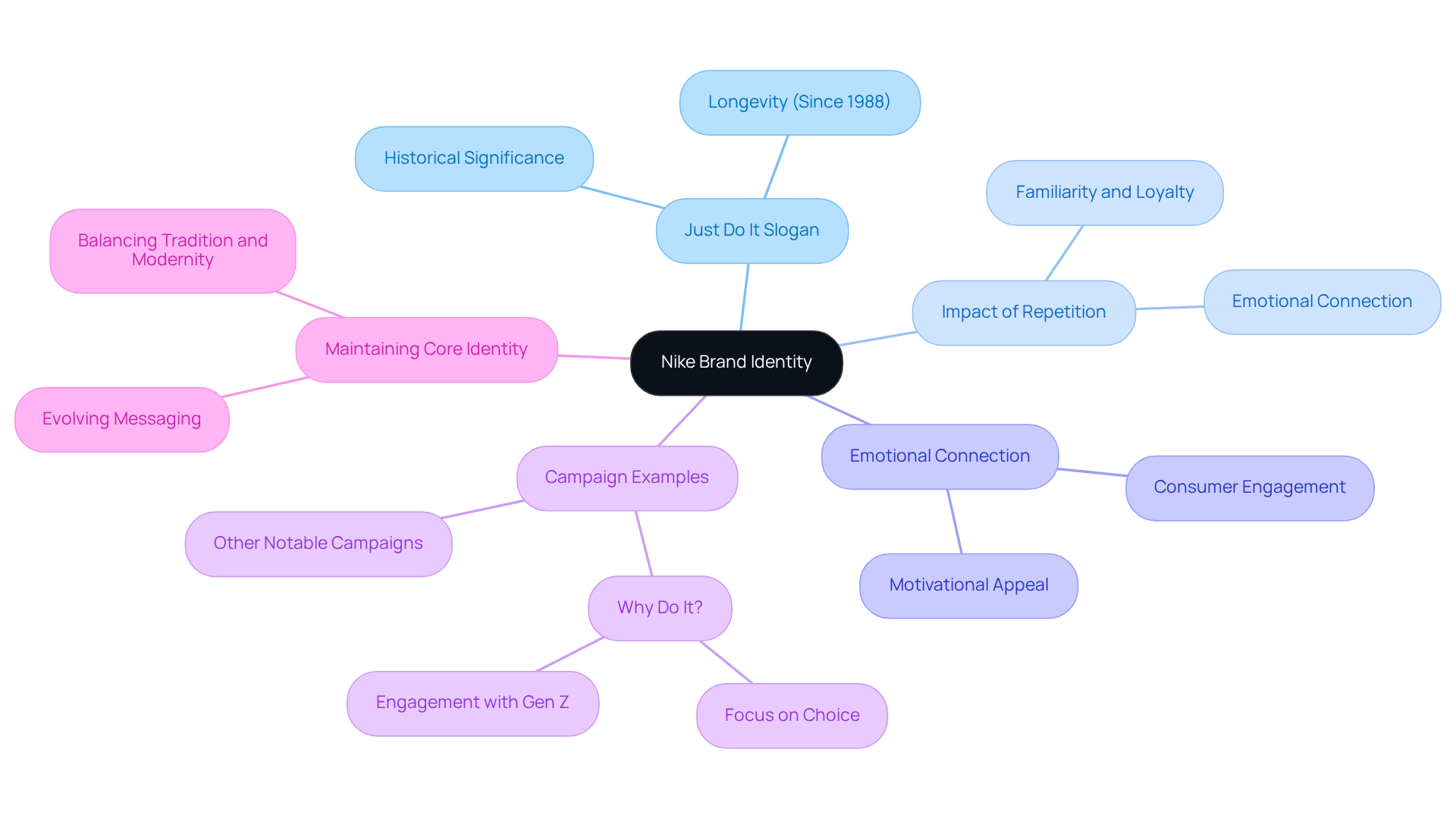
Apple: Reinforcing Brand Loyalty Through Strategic Repetition in iPhone Launches
Apple's iPhone launches illustrate the profound impact of ad repetition in fostering customer loyalty. Each launch event is meticulously crafted to highlight key features and benefits, consistently communicated across various marketing channels. This deliberate ad repetition not only keeps Apple at the forefront of consumers' minds but also strengthens their with the brand. Consequently, customers demonstrate high levels of loyalty and are more inclined to make repeat purchases.
For instance, the anticipation surrounding the iPhone 17 launch was amplified by Apple's consistent messaging about its innovative features, which resonated with buyers. This approach has proven successful, as evidenced by JD.com reporting that trade-in sales for the iPhone 17 were four times higher than during the same period last year, indicating a robust inclination among consumers to upgrade.
Moreover, the influence of strategic ad repetition extends beyond immediate sales; it enhances product recall, ensuring that Apple remains a preferred choice for individuals when considering new devices. Analysts have observed that such marketing strategies not only generate excitement but also cement Apple's status as a leader in the smartphone market.
As noted by Syeda Hamna Hassan, a product marketing expert, 'Apple’s launch events are a huge part of their company's success story and are a testament to how much they invest in their marketing strategy,' highlighting the significance of delivering quality alongside effective messaging. Apple's unwavering commitment to excellence, combined with their ad repetition, has cultivated a loyal customer base that eagerly anticipates each new release.
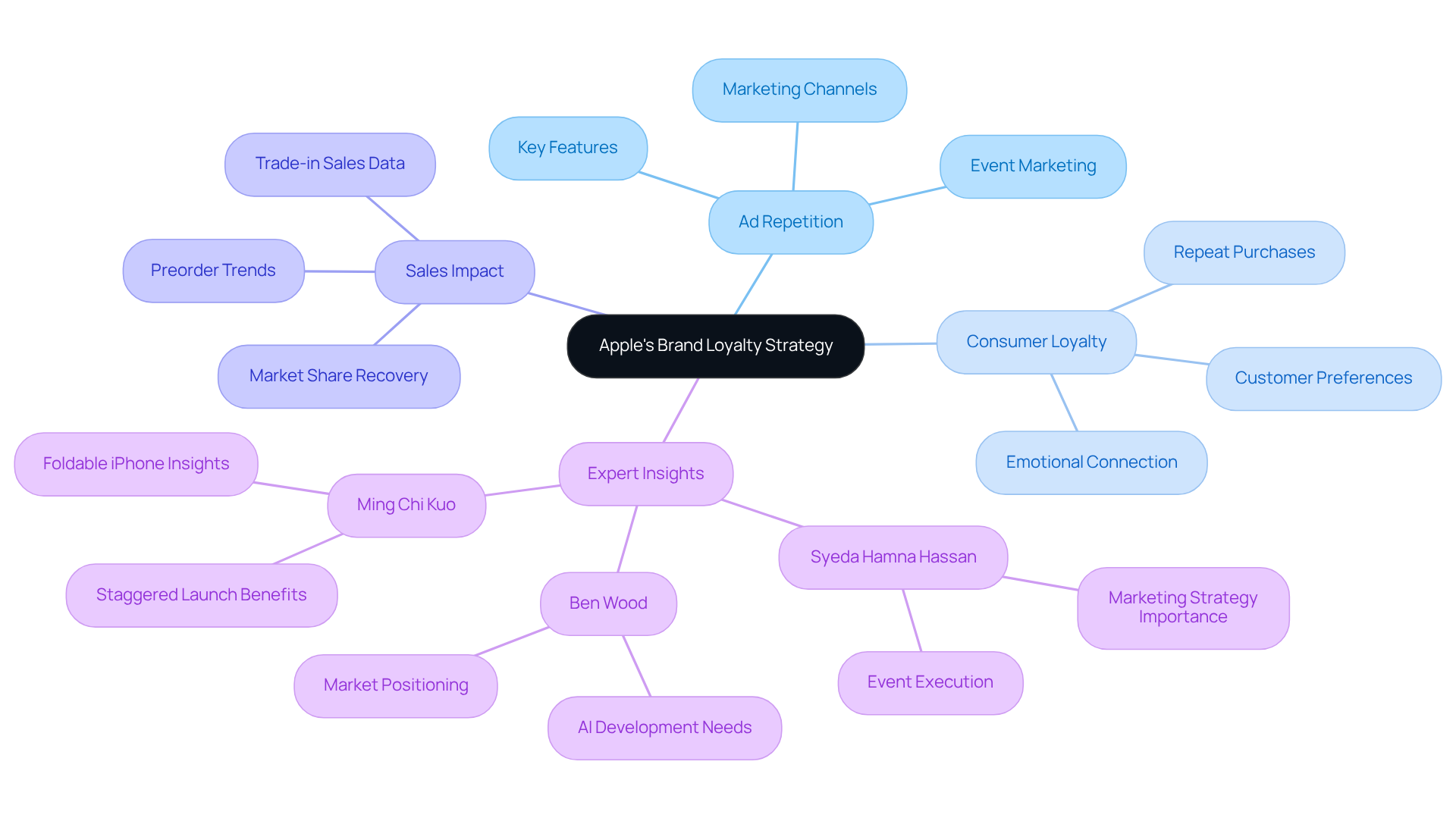
Multi-Channel Approach: Amplifying Brand Messages for Greater Recall
Embracing a multi-channel strategy is essential for companies aiming to enhance their messaging and connect effectively with individuals across various touchpoints. By leveraging platforms such as social media, email, and traditional advertising, organizations can ensure consistent messaging that resonates with their target audience. This approach not only increases visibility but also significantly improves recall; studies reveal that customer retention rates can rise by up to 91% when companies engage with individuals across diverse channels.
Furthermore, omnichannel campaigns yield nearly five times the ROI compared to single-channel efforts, underscoring the effectiveness of this strategy. Ad repetition of reiterated messages in various contexts enhances recognition and trust among customers, thereby increasing the likelihood of remembering names they encounter frequently. A prime example is Coca-Cola's 'Share a Coke' campaign, which effectively utilized repetition across multiple channels to enhance engagement and drive substantial sales growth.
Ultimately, a can lead to a remarkable increase in recall, as individuals typically need to see a message an average of seven times before feeling compelled to purchase. Creativity in ad repetition advertising is crucial to maintaining audience engagement and preventing ad fatigue.
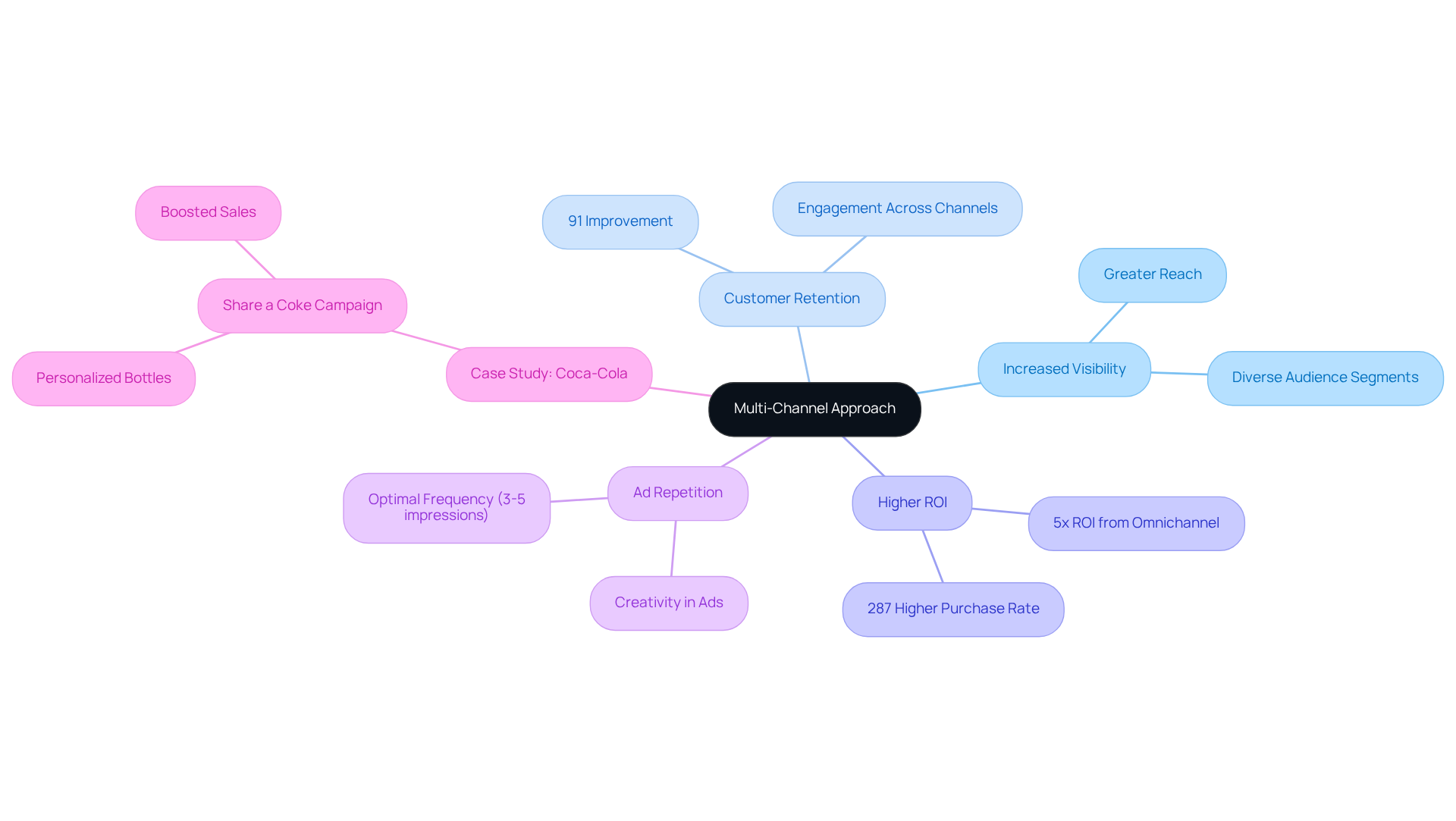
Consistent Messaging: Ensuring Unified Brand Experience Through Repetition
Consistent messaging across all marketing channels is paramount for cultivating a cohesive identity experience. When individuals experience of the same message, it significantly enhances their comprehension and awareness of the brand. This consistency not only fosters trust and familiarity but also facilitates easier recall of the brand name during purchasing decisions.
Research indicates that ad repetition is essential, as it takes 5-7 impressions for an individual to effectively remember a name, underscoring the necessity of maintaining consistency to trigger that memory. Companies that prioritize consistent communication are more likely to achieve elevated levels of customer loyalty and brand recognition.
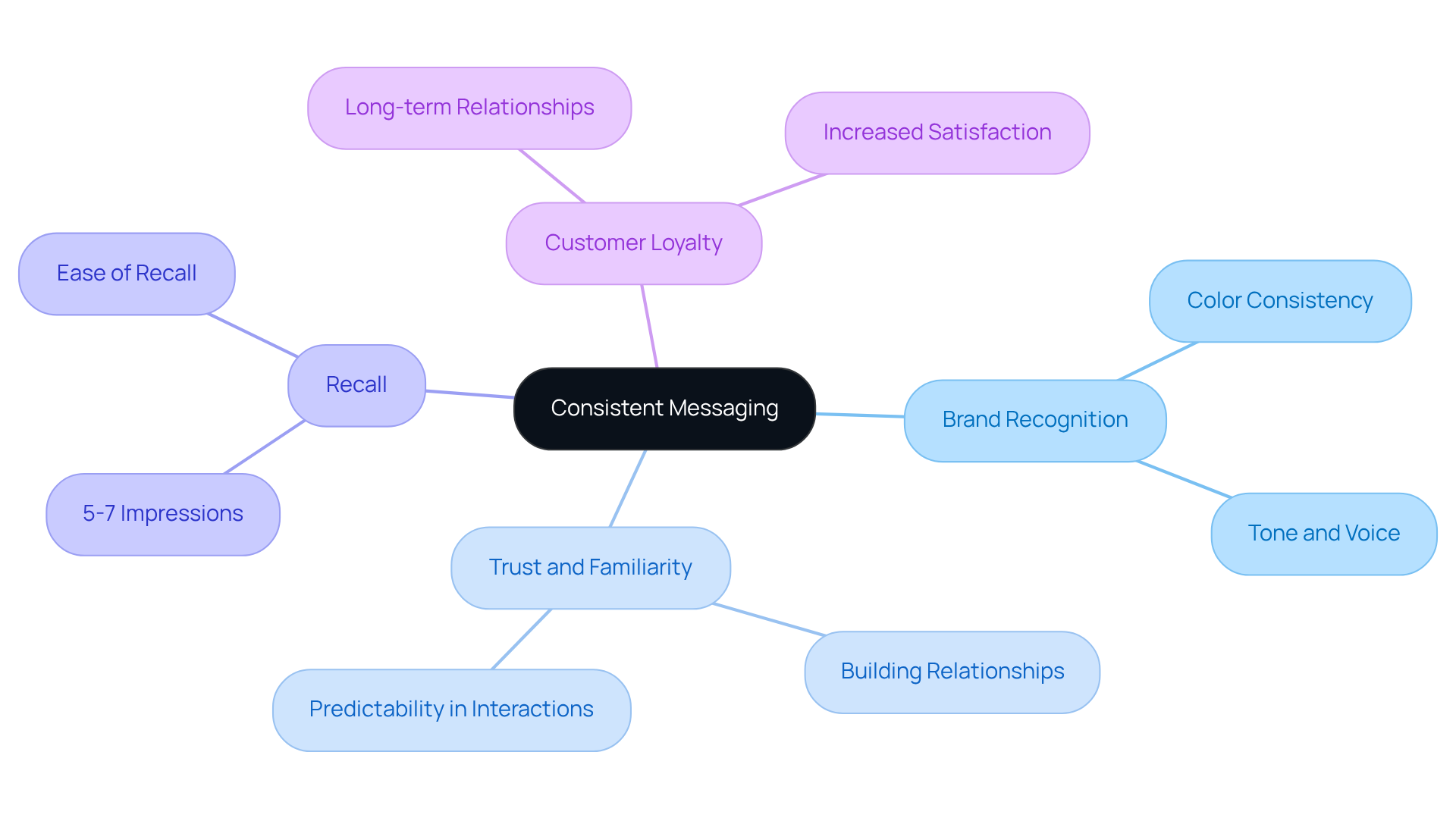
Ad Frequency Balance: Maximizing Recall While Avoiding Consumer Fatigue
Establishing the right balance in ad repetition is crucial for enhancing brand memory while avoiding audience fatigue. Research demonstrates that while ad repetition can bolster recall, excessive exposure may result in annoyance and disengagement. Therefore, brands must aim for a that keeps their message alive in consumers' minds without overwhelming them.
Implementing frequency limits and varying ad creatives are effective strategies to sustain audience interest and mitigate fatigue. By doing so, brands not only maintain relevance but also foster a more engaged consumer base.
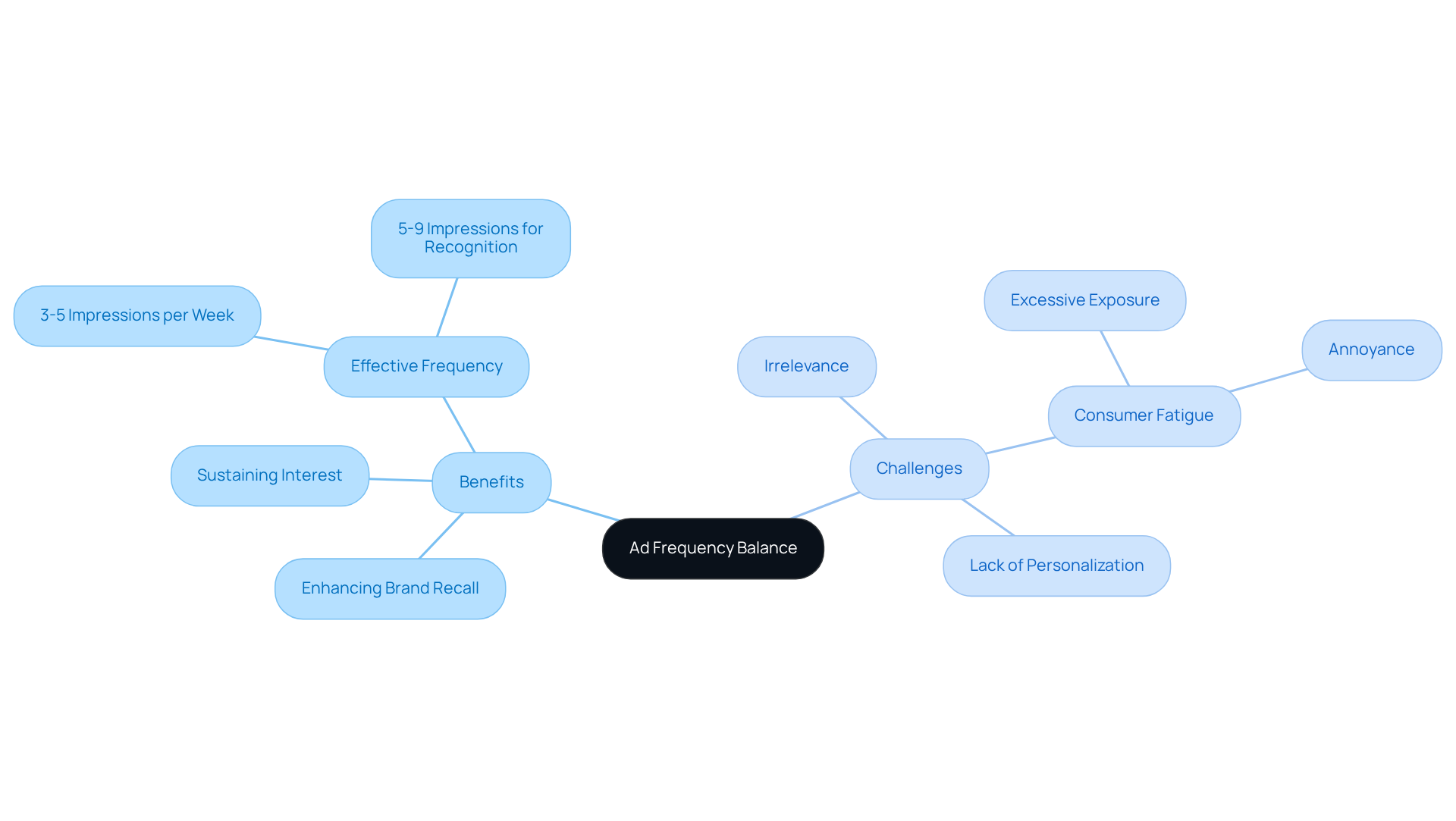
Targeted Approach: Customizing Ad Repetition for Enhanced Engagement
A targeted approach to customizing ad repetition significantly enhances audience engagement. By meticulously examining client information and preferences, companies can tailor their messaging and frequency to connect with specific audience segments. This degree of customization not only boosts engagement but also increases the likelihood of recall, as 80% of shoppers are more inclined to purchase from companies that offer personalized experiences.
Research indicates that consumers are more likely to remember ads that resonate with their interests and needs, reinforcing the effectiveness of targeted strategies. For instance, companies employing a multichannel strategy can achieve an impressive 287% higher purchase rate compared to those relying on a single channel. Furthermore, ads that elicit a psychological response are 31% more effective, demonstrating that combining emotional appeal with repetition can yield stronger long-term outcomes.
As one expert aptly stated, "Repetition isn’t about annoying your audience. It’s about reinforcing your message in the right way, on the right channels, at the right time." Ultimately, a well-tailored ensures that companies stay top-of-mind for clients, thereby driving both engagement and sales. Identifying the optimal ad frequency is crucial to maximizing impact without causing fatigue.

Emotional Engagement: Utilizing Emotional Triggers in Repetitive Advertising
Integrating affective cues into ad repetition significantly enhances product recognition and drives revenue growth. Advertisements that evoke emotions—such as joy, nostalgia, or excitement—resonate more profoundly with consumers, leaving a lasting impression. Research indicates that emotional advertisements lead to higher name retention rates; studies reveal that 81% of participants recalled names from emotional ads compared to 69% from logical ads. By strategically employing ad repetition of emotionally charged messages, companies can cultivate stronger connections with their audience, facilitating easier recall during purchasing decisions.
For instance, Parah Group's case studies illustrate that brands like Grab Green and STRNG Seeds achieved remarkable improvements in conversion rates and average order values after adopting emotionally engaging strategies. Grab Green, for example, tested free shipping thresholds and introduced bundles to encourage larger purchases, resulting in an 80% increase in average order value. Similarly, STRNG Seeds utilized narrative storytelling and personalized landing pages, culminating in a 90% rise in average order value. This underscores the revenue-generating potential of sentiment-driven advertising, as a Nielsen study found that such advertisements can drive a 23% increase in sales.
Furthermore, campaigns that effectively integrate both affective and rational content realize a 26% increase in profitability, demonstrating the efficacy of a balanced approach. Marketing experts emphasize that understanding buyer motivations and leveraging psychological connections are essential for crafting unforgettable and impactful campaigns.
Moreover, advertisements that appeal to emotions engage consumers more effectively than logical ones, influencing perceptions of products and purchasing decisions. Digital ads that evoke strong emotions are four times more impactful, providing a clear quantitative measure of effectiveness. This is particularly crucial for smaller companies, which may struggle with brand awareness; compelling advertising can aid them in connecting with their target audience more efficiently. By focusing on affective involvement, as evidenced in Parah Group's case studies, companies can refine their advertising strategies, ensuring that their messages resonate and remain memorable long after the ad has been viewed.
To leverage these insights, direct-to-consumer (DTC) companies should consider incorporating into their campaigns, ensuring that their messaging aligns with the emotional triggers that resonate with their audience.

The Science of Repetition: Determining Optimal Exposure for Effective Advertising
Understanding the principles of is crucial for companies aiming to enhance memory retention without overwhelming customers. Research indicates that a well-balanced strategy—typically involving ad repetition with multiple exposures over time—can significantly boost product recall while reducing the risk of consumer annoyance. For instance, advertisements placed within news contexts yield 1.7 times the spontaneous recall compared to six-second YouTube commercials, and marketing alongside print and digital news produces a 3.5 times greater lift in recognition than general internet advertising, underscoring the power of strategic placements.
Coca-Cola's 'Share a Coke' campaign serves as a prime example of this balance, employing personalized messaging across diverse channels to forge emotional connections and stimulate engagement. Likewise, Apple's consistent messaging during iPhone launches cultivates anticipation and familiarity, ultimately driving increased sales.
To optimize visibility, companies should analyze user data, including engagement rates, time spent on site, and purchase history, to tailor their strategies effectively. This targeted approach not only enhances recall but also fosters a sense of trust and preference among consumers. Marketers must remain cognizant of the neurological thresholds that determine how much ad repetition is effective before it becomes irritating. Excessive ad repetition can transition from persuasion to annoyance. By diversifying ad formats and delivery methods, brands can sustain consumer interest and maximize the efficacy of their campaigns.
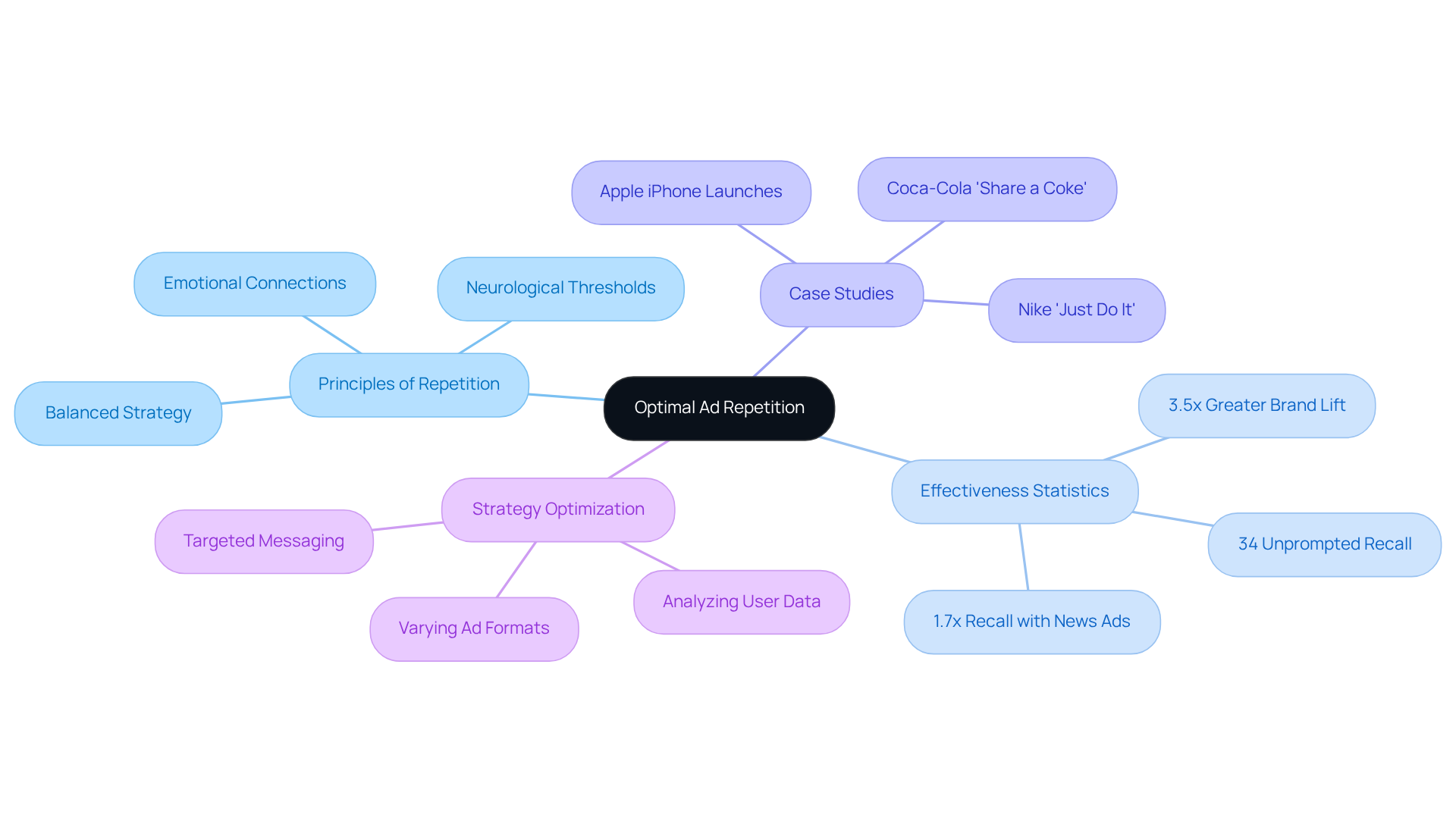
Conclusion
Implementing effective ad repetition strategies is essential for enhancing brand recall and fostering customer loyalty. Understanding the psychological underpinnings of consumer behavior and leveraging tailored approaches enables brands to create memorable experiences that resonate with their audience. The core message emphasizes that strategic repetition, when executed thoughtfully, can significantly elevate brand recognition and drive sales.
Throughout this discussion, various successful case studies illustrate the power of ad repetition:
- Parah Group's data-driven strategies
- Coca-Cola's innovative personalization in the 'Share a Coke' campaign
- Nike's iconic 'Just Do It' messaging
It is evident that repetitive advertising not only boosts recall but also cultivates emotional connections with consumers. Furthermore, the importance of a multi-channel approach and consistent messaging cannot be overstated, as these elements work together to reinforce brand identity and enhance visibility.
Ultimately, brands must recognize the significance of balancing ad frequency to maximize recall while preventing consumer fatigue. Embracing targeted strategies that resonate with specific audience segments and integrating emotional triggers can further amplify the effectiveness of advertising campaigns. By prioritizing these principles, companies can ensure they remain top-of-mind for consumers, driving engagement and fostering long-term loyalty.
Frequently Asked Questions
What is the main focus of Parah Group's services?
Parah Group specializes in Conversion Rate Optimization (CRO) programs designed to help direct-to-consumer (DTC) companies enhance profitability through effective advertising strategies.
How does Parah Group utilize consumer psychology in its strategies?
Parah Group leverages consumer psychology and data analysis to create tailored CRO strategies that boost product recognition, primarily through strategic ad repetition.
What evidence supports the effectiveness of ad repetition?
Research indicates that consistent exposure to advertisements can increase product recognition and memory by up to 80%.
What role do personalized call-to-action buttons play in conversion rates?
Personalized call-to-action buttons have shown to improve conversion rates by 202% compared to standard options, emphasizing the impact of customized messaging in repeated ads.
Can you provide an example of a success story from Parah Group's clients?
One notable success story involved a DTC company that achieved a 36% increase in ROI on ads through optimized ad repetition.
How does Coca-Cola's 'Share a Coke' campaign exemplify effective advertising?
Coca-Cola's 'Share a Coke' campaign personalized bottles with individual names, creating a unique connection with customers, driving purchases, and fostering emotional ties to the brand.
What new features were introduced in Coca-Cola's 2025 campaign targeting Gen Z?
The 2025 campaign included the 'Share a Coke Memory Maker' for creating unique videos and QR codes on bottles to enhance personalization.
How does Nike's 'Just Do It' slogan demonstrate the power of ad repetition?
Nike's 'Just Do It' slogan has been consistently used since 1988, embedding itself in public consciousness and enhancing brand recall through repetitive messaging.
What is the significance of familiarity in marketing according to experts?
Familiarity, cultivated through ad repetition, is critical for fostering customer loyalty and establishing a strong brand identity.
How does Nike balance evolution and core identity in its marketing?
Nike evolves its campaigns while maintaining the core 'Just Do It' message, reinforcing its legacy and engaging both new and existing audiences.
FAQs











